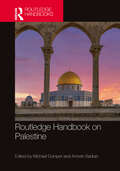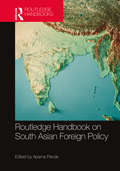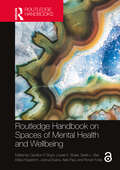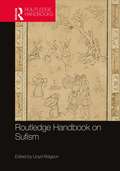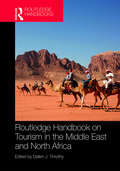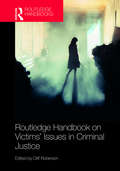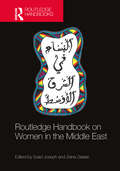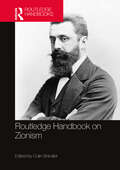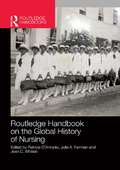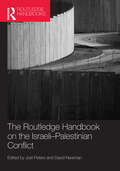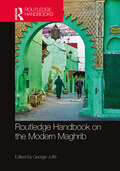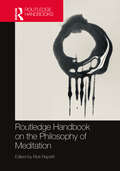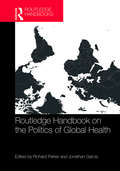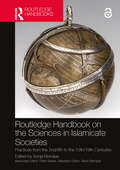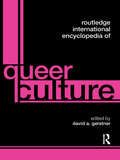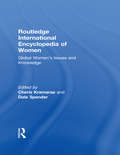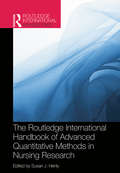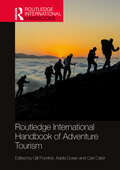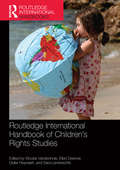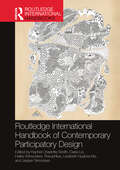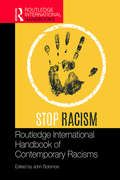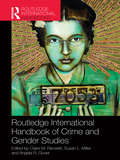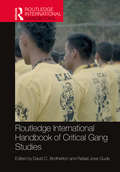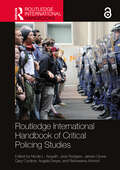- Table View
- List View
Routledge Handbook on Palestine
by Michael Dumper Amneh BadranThis Handbook provides a broad overview of Palestinian history, society, politics, and culture across different contexts and periods, revealing the rich and varied dimensions of Palestine.To capture the diversity of Palestinian scholarship and to introduce readers to a mix of approaches and perspectives, both internationally established and emerging Palestinian scholars have contributed. The Handbook attempts to avoid narrowly framing Palestine around the Israeli-Palestinian conflict, incorporating postcolonial approaches attentive to a broader range of (hitherto overlooked) actors. While a significant proportion of the Handbook examines the contemporary period, it is divided up into four sections that together provide a detailed overview of the main developments in the region: A historical section that contextualizes the complex historical formation of contemporary Palestine – perhaps best regarded as a country but not yet a state A section exploring the society, geography, economy, and identity of Palestine A section on the political significance of Palestine, covering the dynamics between Jewish nationalism (Zionism) and Palestinian nationalism A final section on culture, touching on architecture, literature, music, cuisine, education, and contemporary art Providing a deep analysis of the Palestinian perspective, the Handbook will prove valuable reading for anyone interested in the history, politics and society of Palestine and the Middle East.
Routledge Handbook on South Asian Foreign Policy
by Aparna PandeThis handbook offers a comprehensive overview of South Asian foreign policy, examining the complex history and present state of South Asian foreign policy, the foreign policy of the countries of the region, as well as their relationships with their neighbors and key external players, such as China and the United States, in an effort to understand South Asia’s place in the world order. It illustrates the future trajectory of foreign policy in the region and analyses future of regional arrangements like SAARC (South Asian Association for Regional Cooperation) and BIMSTEC. The handbook is structured in five parts, each representing a focused area of enquiry: Foreign Policy Relations within South Asia Relations within Indo-Pacific Relations with China, Europe and the United States Security A carefully selected collection of 26 chapters written by experts on South Asian foreign, economic, and security policy, this handbook provides an objective yet accessible overview of the history and current state of foreign policy of each country and the region. It is an authoritative reference work for academics and students as well as international think tanks, research institutes, and non-governmental organizations working on South Asian Politics, Asian Politics, Foreign Politics, International Affairs, World History, and International Relations.
Routledge Handbook on Spaces of Mental Health and Wellbeing
by Candice P. Boyd Ronan Foley Alak Paul Louise E. Boyle Sarah L. Bell Ebba Högström Joshua EvansThis handbook critically examines spaces of mental health and wellbeing across multiple, often intersecting, domains from green and blue spaces to lived and embodied spaces, creative spaces, work and home spaces, and institutional and post-institutional spaces.The Routledge Handbook on Spaces of Mental Health and Wellbeing features 45 chapters from leading international scholars who collectively interrogate the spatial dimensions of mental health and wellbeing from conceptual and experiential viewpoints. The ways in which these theoretical developments prompt a re-thinking of mental health and wellbeing as concepts is also discussed before presenting some highlights from the handbook’s five main sections – (1) green and blue spaces, (2) lived and embodied spaces, (3) creative spaces, (4) work and home spaces, and (5) institutional and post-institutional spaces. The key benefits of this book include a great appreciation of the complex networks and assemblages of mental health and wellbeing, the value of a geographical/spatial approach to thinking about mental health, and the vast array of spaces and places that are implicated in human and posthuman notions of wellbeing.This book will be of interest to students and scholars across the social sciences and the humanities as well as researchers and practitioners in the fields of psychology, psychiatry, social work, nursing, health geography, social and cultural geography, anthropology, mental health social studies, cultural theory, and architecture.
Routledge Handbook on Sufism
by Lloyd RidgeonThis is a chronological history of the Sufi tradition, divided in to three sections, early, middle and modern periods. The book comprises 35 independent chapters with easily identifiable themes and/or geographical threads, all written by recognised experts in the field. The volume outlines the origins and early developments of Sufism by assessing the formative thinkers and practitioners and investigating specific pietistic themes. The middle period contains an examination of the emergence of the Sufi Orders and illustrates the diversity of the tradition. This middle period also analyses the fate of Sufism during the time of the Gunpowder Empires. Finally, the end period includes representative surveys of Sufism in several countries, both in the West and in traditional "Islamic" regions. This comprehensive and up-to-date collection of studies provides a guide to the Sufi tradition. The Handbook is a valuable resource for students and researchers with an interest in religion, Islamic Studies and Middle Eastern Studies.
Routledge Handbook on Tourism in the Middle East and North Africa
by Dallen J. TimothyThe Routledge Handbook on Tourism in the Middle East and North Africa examines the importance of tourism as a historical, economic, social, environmental, religious and political force in the Middle East and North Africa (MENA). It highlights the ecological and resource challenges related to water, desert environments, climate change and oil. It provides an in-depth analysis of the geopolitical conditions that have long determined the patterns of tourism demand and supply throughout the region and how these play out in the everyday lives of residents and destinations as they attempt to grow tourism or ignore it entirely. While cultural heritage remains the primary tourism asset for the region as a whole, many new types of tourisms are emerging, especially in the Arabian Gulf region, where hyper-development is closely associated with the increasingly prominent role of luxury real estate and shopping, retail, medical tourism, cruises and transit tourism. The growing phenomenon of an expatriate workforce, and how its segregation from the citizenry creates a dual socio-economic system in several countries, is unmatched by other regions of the world. Many indigenous people of MENA keep themselves apart from other dominant groups in the region, although these social boundaries are becoming increasingly blurred as tourism, being one socio-economic force for change, has inspired many nomadic peoples to settle into towns and villages and rely more on tourists for their livelihoods. All of these issues and more shape the foundations of this book. This Handbook is the first of its kind to examine tourism from a broad regional and inclusive perspective, surveying a broad range of social, cultural, heritage, ecological and political matters in a single volume. With a wide range of contributors, many of whom are natives of the Middle East and North Africa, this Handbook is a vital resource for students and scholars interested in Tourism, Middle East Studies and Geography.
Routledge Handbook on Victims' Issues in Criminal Justice
by Cliff RobersonThe Routledge Handbook on Victims’ Issues in Criminal Justice is a comprehensive and authoritative handbook on current issues, with a distinctive emphasis on the delivery of suitable and effective services. The editor provides an introduction and conclusion to the handbook, synthesizing original contributions from current leaders in the field, surveying victims’ rights in the United States, victim participation in the criminal justice system, victims’ welfare and needs, and most notably the services that have been developed in response. A section on special populations in the United States brings focus to current and emerging issues faced within the country, while a section covering international and transnational victimization explores globalization and the implications of other legal traditions and systems. This handbook addresses the crucial and complex topic of victims’ issues, examining both societal and governmental reactions to victims’ concerns and acquainting readers with the issues that discord may cause, and how they affect the provision of services. This book will serve as an essential reference for academics and practitioners working with crime victims, as well as for students taking courses in victimology, criminology, sociology, and related subjects.
Routledge Handbook on Women in the Middle East
by Suad Joseph Zeina ZaatariThe Routledge Handbook on Women in the Middle East provides an overview of the key historical, social, economic, political, religious, and cultural issues which have shaped the conditions and status of women in the region. The book is divided into eleven thematic sections, providing a comprehensive guide to understanding the current and historical contexts of women in the Middle East, each giving ground-breaking insights into various aspects of women’s movements: • The importance of historical context, including pre-Islamic through post-colonial histories • The importance of politics and the state in understanding women in the ME • Women’s roles in political and social movements • The impacts of the formal and informal economies and education on women of the region • Women’s spaces and the creation of publics and counterpublics • The effects of war, displacement, and other forms of gendered violence • Women, family, and the state • Discourses and practices of religion • Women and health practices • Bodies and sexualities • Women and sites of cultural production A unique overview of cutting-edge research in the key arenas of pre-Islamic to post-colonial histories, this Handbook will affect the way future generations of scholars engage with and add to the vast repository of socio-political studies of the Middle East. It will thus be of interest to researchers in gender studies, women’s studies, pre-Islamic and post-colonial studies, feminist studies, and socio-political and socio-economic studies.
Routledge Handbook on Zionism
by Colin ShindlerThis Handbook, the first of its kind, provides an in- depth examination of the evolution, ideology, history and culture of Zionism and its various movements.Distancing itself from the slogans and cliches of advocacy, the volume provides much-needed context and background on the emergence of Zionism. The Handbook is divided into eight parts – with contributions from some forty of the world’s leading scholars on Zionism –to elucidate its various strands. These include underrepresented areas such as Zionism in the Arab World before the establishment of the State of Israel, Zionism and Marxism, the emergence of the Zionist Right, the language war between Hebrew and Yiddish, the struggle for Jewish women’s suffrage, the poetry of Lea Goldberg, and Zionism in emerging new Jewish communities in locations like Papua New Guinea, Guatemala and Zimbabwe. Another section on Zionism in repressive states stretches from an examination of Zionism in Hitler’s Germany to the Ayatollahs’ Iran today; from subterranean Zionism in Stalin’s Russia to apartheid South Africa. The volume concludes by examining current issues, including the relationship between evangelicals and Zionism in the US, and the representation of Zionism in the age of the internet.Providing a sweeping overview of Zionism in its many forms, the volume will appeal to students, researchers and general readers interested in Jewish studies in the Middle East and beyond, as well as those seeking to understand the roots of contemporary Israel.
Routledge Handbook on the Global History of Nursing NIP
by Patricia D'Antonio Julie A. Fairman Jean C. WhelanA CHOICE Outstanding Academic Title 2014! 2014 winner of the American Association for the History of Nursing’s Mary M. Roberts Award for Exemplary Historical Research and Writing! The Routledge Handbook on the Global History of Nursing brings together leading scholars and scholarship to capture the state of the art and science of nursing history, as a generation of researchers turn to the history of nursing with new paradigms and methodological tools. Inviting readers to consider new understandings of the historical work and worth of nursing in a larger global context, this ground-breaking volume illuminates how research into the history of nursing moves us away from a reductionist focus on diseases and treatments and towards more inclusive ideas about the experiences of illnesses on individuals, families, communities, voluntary organizations, and states at the bedside and across the globe. An extended introduction by the editors provides an overview and analyzes the key themes involved in the transmission of ideas about the care of the sick. Organized into four parts, and addressing nursing around the globe, it covers: New directions in the history of nursing; New methodological approaches; The politics of nursing knowledge; Nursing and its relationship to social practice. Exploring themes of people, practice, politics and places, this cutting edge volume brings together the best of nursing history scholarship, and is a vital reference for all researchers in the field, and is also relevant to those studying on nursing history and health policy courses.
Routledge Handbook on the Israeli-Palestinian Conflict
by David Newman Joel PetersThe Israeli-Palestinian conflict is one of the most prominent issues in world politics today. Few other issues have dominated the world’s headlines and have attracted such attention from policy makers, the academic community, political analysts, and the world’s media. The Routledge Handbook on the Israeli- Palestinian Conflict offers a comprehensive and accessible overview of the most contentious and protracted political issue in the Middle East. Bringing together a range of top experts from Israel, Palestine, Europe and North America the Handbook tackles a range of topics including: The historical background to the conflict peace efforts domestic politics critical issues such as displacement, Jerusalem and settler movements the role of outside players such as the Arab states, the US and the EU This Handbook provides the reader with an understanding of the complexity of the issues that need to be addressed in order to resolve the conflict, and a detailed examination of the varied interests of the actors involved. In-depth analysis of the conflict is supplemented by a chronology of the conflict, key documents and a range of maps. The contributors are all leading authorities in their field and have published extensively on the Israeli-Palestinian conflict/peace process. Many have played a leading role in various Track II initiatives accompanying the peace process.
Routledge Handbook on the Modern Maghrib
by George JofféThis comprehensive Routledge Handbook on the Modern Maghrib introduces and analyses the region in its full complexity, focusing on the countries of Morocco, Tunisia, Algeria, and Libya, as well as the northern and western Sahara. In addition to country studies that provide historical and geopolitical background, a series of thematic explorations engage with a range of social, linguistic, cultural and economic aspects, providing a rich mosaic of current scholarship on the region. Addressing important debates such as the volatile international relations among constituent states, the role of women in society, and the environmental impact of climate change, the book considers natural resources, music, media and language, and revisits the history of borders and social tribal structures. What emerges is not only a variegated picture of the Maghrib as a complex and rapidly changing region, but one marked by stark contrasts and divergences among its constituent states based on their Ottoman and colonial experiences, their relationships with their Saharan and Mediterranean neighbours, and their own political trajectories. This Handbook fills an important gap in knowledge on a region increasingly significant in European and American affairs, and will appeal to anyone interested in the history, economies and societies of North Africa.
Routledge Handbook on the Philosophy of Meditation
by Rick RepettiThis Handbook provides a comprehensive overview and analysis of the state of the field of the philosophy of meditation and engages primarily in the philosophical assessment of the merits of meditation practices. This Handbook unites novel and original scholarship from 28 leading Asian and Western philosophers, scientists, theologians, and other scholars on the philosophical assessment of meditation. It critically assesses the conceptual and empirical validity of meditation, its philosophical implications, its legitimacy as a phenomenological research tool, its potential value as an aid to neuroscience research, its many practical benefits, and, among other considerations, its possibly misleading interpretations, applications, and consequences. Following the introduction by the editor, the Handbook’s chapters are organized in six parts: • Meditation and philosophy • Meditation and epistemology • Meditation and metaphysics • Meditation and values • Meditation and phenomenology • Meditation in Greco-Roman and Judeo-Christian traditions A distinctive, timely, and invaluable reference work, it marks the emergence of a new discipline therein, the philosophy of meditation. The book will be of interest to an interdisciplinary audience in the fields of philosophy, meditation, Buddhism, Hinduism, Taoism, theology, and Asian and Western philosophy. It will serve as the textbook in any philosophy course on meditation, and as secondary reading in courses in philosophy of mind, consciousness, selfhood/personhood, metaphysics, or phenomenology, thereby helping to restore philosophy as a way of life.
Routledge Handbook on the Politics of Global Health
by Richard Parker Jonathan GarcíaIn the early twenty-first century, key public health issues and challenges have taken centre stage on the global scene, and health has been placed at the heart of our collective aspirations for human development and well-being. But significant debate exists not only about the causes, but also about the possible solutions for nearly all of the most important global health challenges. Competing visions of the values and perspectives that should underlie global health policies have emerged, ranging from an emphasis on cost eff ectiveness and resource constraints on one extreme, to new calls for health and human rights, and renewed calls for health and social justice on the other. The role of different intergovernmental agencies, bilateral or unilateral donors, public or private institutions and initiatives, has increasingly been called into question, whilst the spread of neoliberal policies and programmes, and existing international trade regimes and intellectual property rights, are deeply implicated in relation to global health responses. This volume critically evaluates how the global health industry has evolved and how the interests of diverse political and economic stakeholders are shaping the context of a rapidly changing institutional landscape. Bringing together leading authors from across the world, the Handbook’s eight sections explore: • Critical perspectives on global health • Globalisation, neoliberalism, and health systems • The changing shape of global health governance • Development assistance and the politics of global health • Scale-up, scale-down, and the sustainability of global health programmes • Intellectual property rights, trade relations, and global health • Humanitarian emergencies and global health politics • Human rights, social justice, and global health The Routledge Handbook on the Politics of Global Health addresses both the emerging issues and conceptualisations of the political strategies, policy-making processes, and global governance of global health, along with expanding upon and highlighting the critical priorities in this rapidly evolving field. It provides an authoritative overview for students, practitioners, researchers, and policymakers working in or concerned with the politics of public health around the globe.
Routledge Handbook on the Sciences in Islamicate Societies: Practices from the 2nd/8th to the 13th/19th Centuries
by Sonja BrentjesThe Routledge Handbook on the Sciences in Islamicate Societies provides a comprehensive survey on science in the Islamic world from the 8th to the 19th century. Across six sections, a group of subject experts discuss and analyze scientific practices across a wide range of Islamicate societies. The authors take into consideration several contexts in which science was practiced, ranging from intellectual traditions and persuasions to institutions, such as courts, schools, hospitals, and observatories, to the materiality of scientific practices, including the arts and craftsmanship. Chapters also devote attention to scientific practices of minority communities in Muslim majority societies, and Muslim minority groups in societies outside the Islamicate world, thereby allowing readers to better understand the opportunities and constraints of scientific practices under varying local conditions. Through replacing Islam with Islamicate societies, the book opens up ways to explain similarities and differences between diverse societies ruled by Muslim dynasties. This handbook will be an invaluable resource for both established academics and students looking for an introduction to the field. It will appeal to those involved in the study of the history of science, the history of ideas, intellectual history, social or cultural history, Islamic studies, Middle East and African studies including history, and studies of Muslim communities in Europe and South and East Asia.
Routledge International Encyclopedia of Queer Culture
by David A. GerstnerThe Routledge International Encyclopedia of Queer Culture covers gay, lesbian, bisexual, transgender and queer (GLBTQ) life and culture post-1945, with a strong international approach to the subject.The scope of the work is extremely comprehensive, with entries falling into the broad categories of Dance, Education, Film, Health, Homophobia, the Int
Routledge International Encyclopedia of Women: Global Women's Issues and Knowledge
by Dale Spender Cheris KramaraeFor a full list of entries and contributors, sample entries, and more, visit the Routledge International Encyclopedia of Women website.Featuring comprehensive global coverage of women's issues and concerns, from violence and sexuality to feminist theory, the Routledge International Encyclopedia of Women brings the field into the new millennium. In over 900 signed A-Z entries from US and Europe, Asia, the Americas, Oceania, and the Middle East, the women who pioneered the field from its inception collaborate with the new scholars who are shaping the future of women's studies to create the new standard work for anyone who needs information on women-related subjects.
Routledge International Handbook of Advanced Quantitative Methods in Nursing Research
by Susan J. HenlyDesigned to support global development of nursing science, the Routledge International Handbook of Advanced Quantitative Methods in Nursing Research provides a new, comprehensive, and authoritative treatment of advanced quantitative methods for nursing research. Incorporating past approaches that have served as the foundation for the science, this cutting edge book also explores emerging approaches that will shape its future. Divided into six parts, it covers: -the domain of nursing science - measurement—classical test theory, IRT, clinimetrics, behavioral observation, biophysical measurement -models for prediction and explanation—SEM, general growth mixture models, hierarchical models, analysis of dynamic systems -intervention research—theory-based interventions, causality, third variables, pilot studies, quasi-experimental design, joint models for longitudinal data and time to event -e-science—DIKW paradigm, big data, data mining, omics, FMRI -special topics—comparative effectiveness and meta-analysis, patient safety, economics research in nursing, mixed methods, global research dissemination Written by a distinguished group of international nursing scientists, scientists from related fields, and methodologists, the Handbook is the ideal reference for everyone involved in nursing science, whether they are graduate students, academics, editors and reviewers, or clinical investigators.
Routledge International Handbook of Adventure Tourism
by Carl Cater Gill Pomfret Adele DoranThis handbook presents the latest research, industry trends, developments and initiatives in adventure tourism. It explores conceptualisations of adventure tourism, historical and intellectual developments, insights into adventure tourists and the supply side of adventure tourism, and sustainable and inclusive adventure tourism.With contributions from leading international researchers, 28 chapters are organised into four thematic parts to provide a comprehensive overview of adventure tourism. The book presents core topics within the field as well as contemporary themes, debates and challenges within the industry. It adopts a multidisciplinary approach which draws on and applies current research from disciplines including tourism, recreation, sport and psychology to adventure tourism. As such, it presents different ways of examining this form of tourism, expands knowledge on recent developments and discusses the major claims in this field. It explores topics such as instantly accessible adventures, the increasing use of technology by adventure tourists and industry, and the well-being of tourists, destinations and communities. The handbook informs the reader of how literature translates into practice across different adventure tourism operations. It also investigates some of the key challenges affecting the adventure tourism industry and presents practical solutions and initiatives to overcome these. Case studies and vignettes are embedded throughout the handbook to illustrate practitioner perspectives, and each chapter includes learning outcomes and review questions to encourage readers to further consolidate their understanding.The handbook is intended for undergraduates, postgraduates, doctoral candidates and early-career and more established researchers interested in the fields of adventure tourism and related disciplines, such as adventure recreation, outdoor leadership and outdoor education. It is useful for industry organisations, policymakers, professionals and those working towards outdoor activity qualifications. It is also a valuable resource for supportingrelated modules on sustainable tourism, consumer behaviour and marketing in tourism.
Routledge International Handbook of Charisma (Routledge International Handbooks)
by José Pedro ZúqueteThe Routledge International Handbook of Charisma provides an unprecedented multidimensional and multidisciplinary comparative analysis of the phenomenon of charisma – first defined by Max Weber as the irrational bond between deified leader and submissive follower. It includes broad overviews of foundational theories and experiences of charisma and of associated key issues and themes. Contributors include 45 influential international scholars who approach the topic from different disciplinary perspectives and utilize examples from an array of historical and cultural settings. The Handbook presents up-to-date, concise, thought-provoking, innovative, and informative perspectives on charisma as it has been expressed in the past and as it continues to be manifested in the contemporary world by leaders ranging from shamans to presidents. It is designed to be essential reading for all students, researchers, and general readers interested in achieving a comprehensive understanding of the power and potential of charismatic authority in all its varieties, subtleties, dynamics, and current and potential directions.
Routledge International Handbook of Children's Rights Studies
by Wouter Vandenhole Ellen Desmet Didier Reynaert Sara LembrechtsSince the adoption of the UN Convention on the Rights of the Child (1989) children’s rights have assumed a central position in a wide variety of disciplines and policies. This handbook offers an engaging overview of the contemporary research landscape for those people in the theory and practice of children’s rights. The volume offers a multidisciplinary approach to children’s rights, as well as key thematic issues in children’s rights at the intersection of global and local concerns. The main approaches and topics within the volume are: • Law, social work, and the sociology of childhood and anthropology • Geography, childhood studies, gender studies and citizenship studies • Participation, education and health • Juvenile justice and alternative care • Violence against children and female genital mutilation • Child labour, working children and child poverty • Migration, indigenous children and resource exploitation The specially commissioned chapters have been written by renowned scholars and researchers and come together to provide a critical and invaluable guide to the challenges and dilemmas currently facing children’s rights.
Routledge International Handbook of Contemporary Participatory Design (Routledge International Handbooks)
by Jesper Simonsen Rachel Charlotte Smith Heike Winschiers-Theophilus Liesbeth Huybrechts Daria LoiThis handbook offers a comprehensive overview of key themes and agendas in contemporary Participatory Design across diverse disciplines, continents, communities, and practices. Building on Participatory Design’s core values of empowerment and democracy, the handbook explores how the field is developing and diversifying to address contemporary societal challenges in a global community. Participatory Design actively engages peoples, groups and other actors in collaborative design processes to explore and co-create their everyday technologies, practices, and environments. In doing so, Participatory Design aims to address social justice and agency by including diverse actors in the collective shaping of alternative futures. Participatory Design embraces a diverse collection of principles and practices aimed at making technologies, environments, organisations and institutions more responsive to human and planetary needs. In this volume, a multidisciplinary and international group of highly experienced and recognised experts present an authoritative review of the contemporary field and discuss the diverse opportunities and challenges that arise from pivotal issues in Participatory Design, including scaling, collectives, sustainability and more-than-human, decolonisation, emerging technologies and AI, new approaches, methods and engagement beyond academia. The handbook advances contemporary research, theory and practice and highlights case studies that demonstrate how Participatory Design can bring about game-changing shifts in diverse contexts. The volume is an invaluable resource for students, researchers, scholars, and professionals who seek to utilise Participatory Design research and practice to enrich, support and transform complex contemporary conditions towards inclusive, sustainable and transitional futures.
Routledge International Handbook of Contemporary Racisms (Routledge International Handbooks)
by John SolomosThe study of contemporary forms of racism has expanded greatly over the past four decades. Although it has been a focus for scholarship and research for the past three centuries, it is perhaps over this more recent period that we have seen important transformations in the analytical frames and methods to explore the changing patterns of contemporary racisms. The Routledge International Handbook of Contemporary Racisms brings together thirty-four original chapters from international experts that address key features of contemporary racisms. The Handbook has a truly global orientation and covers contemporary racisms in both the western and non-western geopolitical environments. In terms of structure, the volume is organized into ten interlinked parts that include Theories and Histories, Contemporary Racisms in Global Perspective, Racism and the State, Racist Movements and Ideologies, Anti-Racisms, Racism and Nationalism, Intersections of Race and Gender, Racism, Culture and Religion, Methods of Studying Contemporary Racisms, and the End of Racism. These parts contain chapters that draw on original theoretical and empirical research to address the evolution and changing forms of contemporary racism. The Handbook is framed by a General Introduction and by short introductions to each part that provide an overview of key themes and concerns. Written in a clear and direct style, and from a conceptual, multidisciplinary and international perspective, the Handbook will provide students, scholars and practitioners with an overview of the most pressing issues of Racisms in our time.
Routledge International Handbook of Crime and Gender Studies (Routledge International Handbooks)
by Susan L. Miller Claire M. Renzetti Angela R. GoverCriminological research has historically been based on the study of men, boys and crime. As a result, the criminal justice system’s development of policies, programs, and treatment regimes was based on the male offender. It was not until the 1970s that some criminologists began to draw attention to the neglect of gender in the study of crime, but today, the study of gender and crime is burgeoning within criminology and includes a vast literature. The Routledge International Handbook of Crime and Gender Studies is a collection of original, cutting-edge, multidisciplinary essays which provide a thorough overview of the history and development of research on gender and crime, covering topics based around: theoretical and methodological approaches gender and victimization gender and offending gendered work in the criminal justice system future directions in gender and crime research. Alongside these essays are boxes which highlight particularly innovative ideas or controversial topics – such as cybercrime, restorative justice, campus crime, and media depictions. A second set of boxes features leading gender and crime researchers who reflect on what sparked their interest in the subject. This engaging and thoughtful collection will be invaluable for students and scholars of criminology, sociology, psychology, public health, social work, cultural studies, media studies, economics and political science.
Routledge International Handbook of Critical Gang Studies (Routledge International Handbooks)
by David C. Brotherton; Rafael Jose GudeRoutledge International Handbook of Critical Gang Studies is rooted in the instability, inequality and liquidity of the post-industrial era. It understands the gang as a complex and contradictory phenomenon; a socio-historical agent that reflects, responds to and creates a certain structured environment in spaces which are always in flux. International in scope and drawing on a range of sociological, criminological and anthropological traditions, it looks beyond pathological, ahistorical and non-transformative approaches, and considers other important factors that produce the phenomenon, whether the historically entrenched racialized power structure and segregation in Chicago; the unconstrained state-abandoned development of favelas in Brazil; or the colonization, displacement and dependency of people in Central America. This handbook reflects and defines the new theoretical and empirical traditions of critical gang studies. It offers a variety of perspectives, including: A view of gangs that takes into consideration the global context and appearance of the "gang" in its various forms and stages of development; An appreciation of the gang as a socio-cultural formation; A race-ethnic and class analysis of the gang that problematizes domain assumptions such as the "underclass"; Gender variations of the gang phenomenon with a particular emphasis on their intersectional properties; Relations between gangs and the political economy that address the dominant mode of production and exchange; Treatments that demonstrate the historically contingent nature of gangs and their changes across time; The contradictory impact of gang repressive policies, institutions and practices as part of a broader discussion on the nature of the state in specific societies; and Critical methodologies on gangs that involve discussions of visual and textual representations and the problematics of data collection and analysis. Authoritative, multi-disciplinary and international, this book will be of interest to criminologists, sociologists and anthropologists alike, particularly those engaged with critical criminology/sociology, youth crime, delinquency and global social inequality. The Handbook will also be of interest to policy makers and those in the peacebuilding field.
Routledge International Handbook of Critical Policing Studies (Routledge International Handbooks)
by Gary Cordner Angela Dwyer Nicole L. Asquith James Clover Jess Rodgers Rishweena AhmedCritical analyses of policing have accompanied accounts of the police since the early days of modern police organisations. More so than ever, police and policing are subject to close and critical scrutiny from governments and the public. It is timely, therefore, to consider what is critical about police and policing.The Routledge International Handbook of Critical Policing Studies brings together scholars and practitioners to critically explore the full continuum of safety governance from police reforms to the redistribution of policing resources to the replacement of state police. In offering the three Rs of policing—reform, redistribute, replace—we provide a conceptualisation of critical policing studies that acknowledges a continuum of policing that mirrors the different trajectories, priorities, and possibilities that exist across different cultural and historical contexts. This collection is composed of 65 scholars and practitioners across 39 chapters, edited by a team of police pracademics and policing scholars, to showcase accounts of policing from outside the Anglo-European metropole, privileging works from First Nations people and from the Global South, and presenting contextualised solutions to the problems facing police and communities.This Handbook identifies the key issues facing the police and safety governance across the globe and offers insights into the implications for policing theory and practice, proposing solutions to some of the most intransigent problems facing contemporary societies. Individually, and as a collection, this Handbook will be an essential read for scholars, practitioners, and activists alike.
